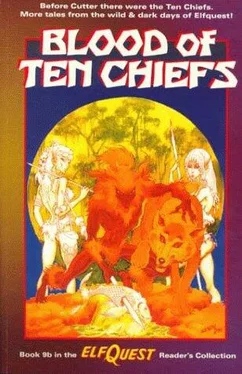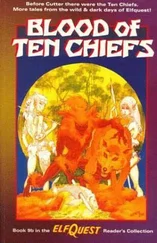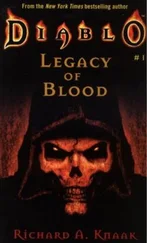Richard Pini - The Blood Of Ten Chiefs
Здесь есть возможность читать онлайн «Richard Pini - The Blood Of Ten Chiefs» весь текст электронной книги совершенно бесплатно (целиком полную версию без сокращений). В некоторых случаях можно слушать аудио, скачать через торрент в формате fb2 и присутствует краткое содержание. Год выпуска: 1986, ISBN: 1986, Издательство: A TOR Book, Жанр: Фэнтези, на английском языке. Описание произведения, (предисловие) а так же отзывы посетителей доступны на портале библиотеки ЛибКат.
- Название:The Blood Of Ten Chiefs
- Автор:
- Издательство:A TOR Book
- Жанр:
- Год:1986
- ISBN:0-812-53043-8
- Рейтинг книги:3 / 5. Голосов: 1
-
Избранное:Добавить в избранное
- Отзывы:
-
Ваша оценка:
- 60
- 1
- 2
- 3
- 4
- 5
The Blood Of Ten Chiefs: краткое содержание, описание и аннотация
Предлагаем к чтению аннотацию, описание, краткое содержание или предисловие (зависит от того, что написал сам автор книги «The Blood Of Ten Chiefs»). Если вы не нашли необходимую информацию о книге — напишите в комментариях, мы постараемся отыскать её.
The Blood Of Ten Chiefs — читать онлайн бесплатно полную книгу (весь текст) целиком
Ниже представлен текст книги, разбитый по страницам. Система сохранения места последней прочитанной страницы, позволяет с удобством читать онлайн бесплатно книгу «The Blood Of Ten Chiefs», без необходимости каждый раз заново искать на чём Вы остановились. Поставьте закладку, и сможете в любой момент перейти на страницу, на которой закончили чтение.
Интервал:
Закладка:
To wrap this up, I need to take a cue from a bit of advice that appeared, again, in Thieves' World. (The relationship between Asprin, Abbey, Pini, and Pini truly is not as incestuous as it appears from this introduction—at least, I'll never admit to it.) This sage advice has to do with internal consistency.
The perceptive reader—and particularly that reader who may already be a fan of Elfquest—may come across this or that bit of information (dialogue, exposition, characterization) that seems inconsistent or even at odds with something else read somewhere else. This may produce a certain sensation of cognitive discomfort unless the reader remembers two important rules:
1) There are no inconsistencies.
2) If an inconsistency is discovered, refer to Rule 1.
Seriously, any bending or stretching of what heretofore (or hereafter) might have been considered "reality" is no doubt due to one or more of the following:
First, each writer in this collection has his or her own style, his or her own fascination, his or her own approach, his or her own prejudices, and so on. As long as a writer stays within the (deliberately) flexible boundaries of this world, vivent les differences!
Second, the characters in here, major and minor, have their own motivations, memories, needs, and desires no less so than the aforementioned writers. Probably more so. They (the characters) act as they are driven, and while I in my biased way tend to imbue all of them with a certain nobility, in no way should they be considered to be namby-pamby. They act as we might.
Finally, because these characters tend to live a long while (by human standards), and because they tend to think in the present rather than dwell on the past, memories of things get hazy. Lessons learned by one chief may or may not survive the test of time. Cause and effect may become jumbled in the retelling of an event. Apparently, the oral application of dreamberries aids memory, but the potent intoxication that follows may wipe out any benefit thus derived!
(By the way, we do welcome letters of comment; just write to us in care of the publisher.)
The World of Two Moons is a new, fresh, raw place, with many gray areas on the map, and that map will be a long time in the filling. The history of the ten chiefs who lead up to Cutter is likewise peppered with gaps and forgotten tales waiting to be told. And I must say that I look forward with wolfish anticipation to that process of mutual discovery.
They had given Whiteclaw back to the forest and the pack that morning. The old wolf had spent his last days in the soft grass beside his elf-friend's den. It had been midnight, or later, when Briar realized the time for mercy had finally arrived and had summoned the healer, Rain, from his root-nest den.
Although the bond between elf-friend and wolf-friend was a special, private thing, the ties between the Wolfriders and the wolf-pack were almost as close. The wolves began their howl before Rain had lifted his hands from Whiteclaw's neck. Those elves who were at the Father Tree made their way to Briar's den to share his sorrow and say farewell to a friend.
There were few among the elves who had not said goodbye to a wolf-friend at least once. One was the chief's young son who had not, as it happened, witnessed such a leave-taking with open, comprehending eyes. He knew their wolves, though long-lived for forest animals, could not hope to live as long as a Wolfrider, but he had not felt it before. His tongue went as stiff and lifeless as old leather; his fingers refused to touch the somehow-different fur.
With no thoughts except his own despair, Cutter shook off his mother's gentle mindtouch and plunged into the forest at a blind run. He called to Nightrunner, his own wolf-friend. The young wolf, confronted with a choice between his pack and his elf-friend, hesitated only a moment before coming to Cutter's side. He, too, loved the hunt but felt no peace in the presence of death.
They were still together late in the day when Longreach, prompted by a grief he had witnessed many times before, found them. The old elf said nothing at first, just sat where they could see him and feel his compassion. Finally, when the sun began to set, the storyteller spoke.
"The pack and Briar have both chosen, and a fine choice indeed. A yearling so full of wild-water he can only call him Mischief and hope that his den, his clothes and his arrows survive—"
**How?** The youth's thought rode a wave of emptiness into the old elf's mind. For Cutter, deep in the Now of the wolf-song, there could only be Nightrunner; beyond Nightrunner was an emptiness that made midnight bright by comparison.
"It is part of the Way," Longreach said, laying a hand on both wolf and elf. "It is part of what it means to be a Wolfrider: to dive so deeply into life and love that you lose all sense of yourself and the turning of the seasons; to wake up one morning and find yourself a new person, sometimes full of joy and sometimes pain; and then to dive back in again.
"It has been like this since the beginning. I'll show you—"
Pendulum by Richard Pini
This time, and for the first time, death bothered Timmorn.
That in itself was very strange, for this twilight hunt seemed little different from any of the others that mingled in the half-elfs memory. Memory itself was mostly an elusive thing for Timmorn, images of recent yesterdays swirling and clouding like muddied water with sensations of long ago— which might be an eight-of-days or many turns of the seasons. But something in this evening, something twisting in his mind as a light snow began to dust the woods, something nibbled at him, something ...
Certainly it was not, could not be the killing of the prey, the death of the black-neck. That had been a good kill, though Timmorn had participated only little in it. The wolves, the wolves who were his—brothers—no. Yes? His friends, yes, that too. The killing of the prey, the chase, the fluidity of his brother-friends as they ran and harried, the tearing of the throat, the shock and final, reflexive shudder—these were not the source of the irritating itch that Timmorn felt at the back of his mind. All this had happened before.
He paced, restless, tasting his memories of this hunt, sorting by scent and touch this one from the others, seeking a clue. It worried at him, as a burr that he could not reach might. He pulled into clearer focus pleasure at the tang of the hot blood as the buck gave up its life into the ground and to the tongues of the wolf-pack. Pleasure, yes, even though he had not done much to bring down the prey, though he was not really of the pack. Pleasure because blood was strong in the air and on Timmorn's face. Without thinking, he ran his tongue over the sharp teeth that had, after the high wolves had taken their due, helped to break the joints and pull the red muscle from the bones. Yes, it had been a good kill, and promised to be ...
A promise. The tribe! The fine buck could fill the bellies of the wolves, but Timmorn caught another shred of memory: there would be enough for himself and the ones he had left behind, at the camp. There would be meat for the elves left behind who did not hunt. But the promise was broken, and his stomach was still empty and growled at the blood-taste which promised nothing. There would be no meat. The mad longtooth had seen to that.
Was that it? Timmorn held in his pacing and cocked his head as if to listen more closely to the question in his head. Flakes of snow gathered on his wild hair and pointed ears, and his eyes, his yellow eyes, seemed to glow in the lowering light. Was that it? The pack had only begun to feed when the attack came. Snouts slick and clotted with sweet blood, the wolves did not sense the raging, silvery mass of the rogue longtooth until it was among them, yowling and scattering the smaller beasts in its frenzy. The wolves closest to the carcass had gotten the worst of it, but they had all—all? —escaped the longtooth's fury and tusks. Timmorn held onto the picture in his head: the creature, eyes wild; the wound, ugly and half-healed, that ran along the thing's flank; he remembered the stink of infection. The beast had not come out of its dark place to attack the wolf-pack. No, it had come to feed, to take what the others had brought down, what it no longer could bring down because of its wound and its madness. But that still meant that the pack went hungry now, and that the tribe would go hungry. There would be disappointment, keenly felt, and Timmorn knew even as he thought it that that disappointment would be turned toward him. The longtooth had taken the carcass, and neither Timmorn nor the wolves would follow into the deep forest.
Читать дальшеИнтервал:
Закладка:
Похожие книги на «The Blood Of Ten Chiefs»
Представляем Вашему вниманию похожие книги на «The Blood Of Ten Chiefs» списком для выбора. Мы отобрали схожую по названию и смыслу литературу в надежде предоставить читателям больше вариантов отыскать новые, интересные, ещё непрочитанные произведения.
Обсуждение, отзывы о книге «The Blood Of Ten Chiefs» и просто собственные мнения читателей. Оставьте ваши комментарии, напишите, что Вы думаете о произведении, его смысле или главных героях. Укажите что конкретно понравилось, а что нет, и почему Вы так считаете.












